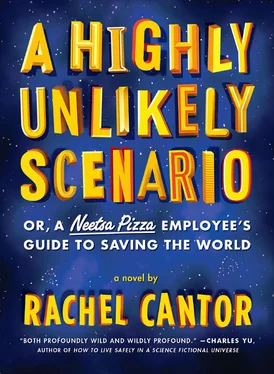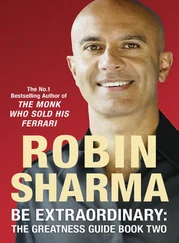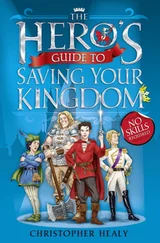As they hurtled, motionless, through space-time, Felix saw a time when he was no longer dumped onto the municipal compost heap, when he and his mother read from his great-grandfather’s books together, and he filled his opus with accounts of what he’d seen in a script no one but he and Sally could understand. Sally saw Isaac’s purpose, and all of Leonard’s journeys. She saw herself organizing a freedom army to establish a postdenominational society where no citizen would be judged by the food they ate. Leonard saw Isaac, who still spoke to him in the voice of his grandfather: Boychik, he said, you did good, you did very very good, you saved the world again , you are a good egg, and that Sally of yours, she’s a good egg, and Felix, now you know: he will never share that opus with anyone but the grandchildren. This was the most important thing we ever ever do. You listening? I’m glad you’re listening, because there’s this Moses de Leon in Spain, your trip to Rome sent psychic waves all bananas over to him and now he’s talkin’ to Shimon bar Yochai eleven centuries before, and we gotta do somethin’. You in? Isaac asked, and Leonard nodded his insubstantial head outside of time and space, which Isaac seemed to understand.
And in less time than it took for a cat to blink, they were home.
Meow, said Medusa.
An Interview with the Author
Jewish mysticism plays a large part in A Highly Unlikely Scenario , from the characters of Isaac and Abulafia to the clapping song to the idea of ibburs and gilguls. Where does your interest in mysticism come from, and how have you pursued it?
Every year for about ten years I went on a meditation retreat led by some very interesting rabbis who often talked about Jewish mystical ideas, which I then read more about on my own. In particular, they introduced us to some of Abulafia’s mystical practices, which involve combining Hebrew letters with vowels in particular patterns. These are concentration practices, but also practices of the body, as you breathe in and out with the letters. We learned that these were powerful practices, not to be engaged in lightly or shared willy-nilly with others. It was, in fact, one of these rabbis who inspired A Highly Unlikely Scenario by mentioning (offhandedly?) the incredible proliferation of mystical thinking in the thirteenth century, which is when Abulafia and Isaac the Blind lived. But Jewish mysticism is filled with wonderful ideas — I don’t think I’m done exploring them in fiction.
Another of your interests appears to be the history of science, including figures like Roger Bacon. Is there something about the omnivorous intellectual curiosity of people like Bacon, who studied optics, astronomy, mathematics, and possibly flying machines (not to mention philosophy and theology), that appeals to you?
There’s something compelling about thinkers — I won’t call them Renaissance figures, because Roger Bacon was definitely a medieval man — who are interested in everything , who see the connections in everything . Bacon is one of those early scientific figures who doesn’t see neat separations between the material, the spiritual, and the intellectual, and who finds explanations offered by alchemy or theology to be just as compelling as those offered by optics or engineering. He actually did construct a head made of brass (a brazen head) that was meant to serve as oracle. Who wouldn’t want to write about such a figure?
The world of the novel is meticulously detailed, from the food, clothes, and hairstyles to things like the Hello! lamps on Everything’s-Okay poles. Did you have this particular setting in mind, or did you invent aspects of it as you went along?
Everything about the book’s invented setting evolved with the book; coming up with these details was one of this book’s great pleasures. Nothing is more fun than starting a sentence not knowing how it will end. While some aspects of the book had to be more controlled, even in the first draft — the cosmology, the three-part structure — most of the details could be invented spontaneously. The Scottish dishes prepared by Carol’s restaurant, however, are all real, and none are probably bite-size!
You spent some of your childhood in Rome. Did you draw on those memories when you were portraying medieval Rome in the book? What’s your favorite place to visit in Rome?
A lot of the Roman setting did come from memory — most notably, the itinerary Sally and Leonard follow as they travel around the city: to the river, across the bridge, past the Castel Sant’Angelo, to the old St. Peter’s, down the river, past the island to the Portico of Octavia (the fish market), and on to the Theater of Marcellus. There’s not a lot left in Rome that’s medieval, though, apart from some churches, so I also looked over old maps and read books about the medieval city — its pilgrims, architecture, daily life, weapons, the Inquisition, the Jewish population, and so on. The St. Peter’s in the book, for example, is the old St. Peter’s, which was demolished to make room for the basilica, of Michelangelo fame, that we now see. My favorite Roman places did not make it into the book: the multileveled San Clemente church, for example; or Trastevere, the neighborhood where I grew up; or the flea market at Porta Portese. As well as numerous pizzerie and gelaterie !
One of the most poignant relationships in the book is the one between Leonard and his grandfather, especially as Leonard realizes what his grandfather was trying to get across to him all those years, with his stories and strange questions. And in a more general sense, the novel seems especially concerned with different generations learning to understand and appreciate each other. I guess what I’m asking is: do you have nephews with magical powers and a grandfather who likes herring?
Hah! I do have nieces and nephews — four, at last count — each as precocious and precious as Felix, if not more so. This book is dedicated to them, in fact — their imagination and magical sense of what’s possible. It’s also a book about received wisdom, wisdom transmitted from generation to generation. The word Kabbalah refers to what is received (and we remember that receptivity is Leonard’s Special Gift!). Transmission of learning and heritage through the generations is important here, but so is the simpler transmission of love and care between and among generations.
Reading Group Guide
1. Rachel Cantor’s A Highly Unlikely Scenario has all the hallmarks of a traditional work of science fiction — time travel, a futuristic world, artificial intelligence. When you were reading A Highly Unlikely Scenario , did you feel like you were reading science fiction? Was there anything in the text that you were surprised to find in a science fiction novel?
2. Food is everywhere in this book. Leonard, the novel’s protagonist, is “a good egg” (this page) who works in the complaints department of Neetsa Pizza — a fast-food company that sells “pizza shaped according to Pythagorean principles” (this page). His sister, Carol, makes “revolutionary stew” with “ingredients [that] remind us of our agrarian past” (this page). And the novel is populated by groups that identify themselves through food: “Survivalists wearing camouflage and offering samples of dried chipmunk; Heraclitan Grill flamethrowers in their characteristic fireproof togs; also, royal pages from the monarchists’ Food Court, [and] barbecuties from the Whiggery Piggery (this page).” What is the significance of food in Cantor’s novel? Is food really at the center of the novel, or does Cantor use food as a vehicle for talking about ideas that are more central to the text?
Читать дальше












